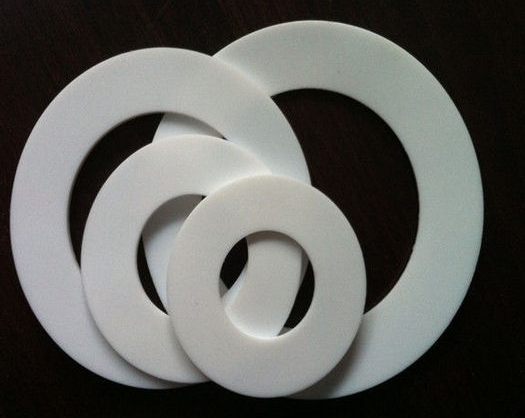- 13
- Nov
PTFE gasket
PTFE gasket
PTFE gaskets have excellent properties of creep resistance, cold flow resistance, ultra-low temperature resistance, no pollution, and easy installation and disassembly. Under a small pre-tightening force, it can withstand considerable internal pressure even in a pressure fluctuation environment. It is very suitable for rough or unevenly worn and fragile glass-faced flanges and temperature-changing sealing occasions. We can choose Gore, Klinger, Garlock, Sealon and other expanded PTFE sheets for customers to produce the required gaskets for customers.
advantage
High temperature resistance-the working temperature can reach 250℃.
Low temperature resistance-has good mechanical toughness; even if the temperature drops to -196 ℃, it can maintain 5% elongation.
Corrosion resistance-It is inert to most chemicals and solvents, and can withstand strong acids and alkalis, water and various organic solvents.
Weather resistance-has excellent aging life in plastics.
High lubrication-is the low coefficient of friction in solid materials.
Non-adhesion-it means that the surface tension in the solid material is small and does not adhere to any substance. Its mechanical properties have a very small friction coefficient, which is only 1/5 of that of polyethylene. This is an important feature of the perfluorocarbon surface. In addition, because the fluorine-carbon chain intermolecular forces are extremely low, PTFE is non-sticky.
Non-toxic and harmful-with physiological inertia, as an artificial blood vessel and organ implanted in the body for a long time without adverse reactions.
Electrical properties Polytetrafluoroethylene has low dielectric constant and dielectric loss in a wide frequency range, and has high breakdown voltage, volume resistivity and arc resistance.
Radiation resistance Polytetrafluoroethylene has poor radiation resistance (104 rad), and it degrades after being exposed to high-energy radiation, and the electrical and mechanical properties of the polymer are significantly reduced. Application Polytetrafluoroethylene can be formed by compression or extrusion processing; it can also be made into water dispersion for coating, dipping or making fibers. PTFE is widely used as high and low temperature resistant, corrosion resistant materials, insulating materials, anti-stick coatings, etc. in nuclear energy, aerospace, electronics, electrical, chemical, machinery, instruments, meters, construction, textiles, food and other industries.
Atmospheric aging resistance: radiation resistance and low permeability: long-term exposure to the atmosphere, the surface and performance remain unchanged.
Non-combustibility: The oxygen limit index is below 90.
Acid and alkali resistance: insoluble in strong acids, strong alkalis and organic solvents.
Oxidation resistance: resistant to corrosion by strong oxidants.
Acidity: Neutral.
The mechanical properties of PTFE are relatively soft. Has a very low surface energy.
Polytetrafluoroethylene (F4, PTFE) has a series of excellent performance: high temperature resistance-long-term use temperature of 200~260 degrees, low temperature resistance-still soft at -100 degrees; corrosion resistance-resistance to aqua regia and all organic solvents; Weather resistance-aging life in plastics; high lubrication-with a small coefficient of friction (0.04) in plastics; non-stickiness-with low surface tension in solid materials without adhesion of any substances; non-toxic-with physiological inertness; excellent electrical properties , Is an ideal C-level insulating material.

